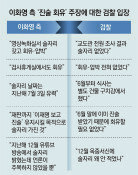Trump calls for a ‘reciprocal tax’ on South Korea and Japan
Trump calls for a ‘reciprocal tax’ on South Korea and Japan
Posted February. 14, 2018 07:51,
Updated February. 14, 2018 07:51
U.S. President Donald Trump said Monday that he would push for a “reciprocal tax” against countries, including its allies such as South Korea and Japan, that levy tariffs on American products. “The United States loses vast amounts of money with China and Japan and South Korea and so many other countries. It’s a little tough for them because they’ve gotten away with murder for 25 years,” said Trump. His administration will “impose a tax to charge other countries,” he added and said that “some of them are so-called allies but they’re not allies on trade,” apparently targeting South Korea and Japan.
If a reciprocal tax is introduced as Trump calls for, imports from other countries will be taxed at the same rates those countries impose on U.S. products, undermining the price competitiveness of imports sold in the United States. What is behind President Trump’s remark is his country’s widening trade deficit, which grew to 566 billion U.S. dollars last year, its highest level over the past nine years. The United States has pledged to the World Trade Organization (WTO) a “3.5 percent applied tariff rate, compared to 9.9 percent for China and 5.2 percent for the European Union.”
Tax policies are decided by the Congress, so it remains to be seen whether President Trump’s idea of imposing a reciprocal tax will actually be realized. Not a few lawmakers at the Congress are voicing their concern over resulting inflation. Moreover, levying a separate tax, which effectively works as a tariff in trade based on bilateral free trade agreements (FTA) or WTO regulations, is the violation of the WTO rules and severely damages the international trade order. Yet, it can still be threatening to U.S. trade partners if President Trump starts to aggressively persuade the Congress ahead of the midterm elections scheduled for November.
In fact, what President Trump is calling for seems to be more like a “revenge tax” rather than a reciprocal tax. It is also worrisome that Trump’s ever more flagrant pursuit of trade protectionism resembles the stance taken by the country when it enacted the Smoot-Hawley Act in 1930. Back then, the United States increased the tariff rate on imports by up to 59 percent to be met by the retaliatory tariffs by other countries, dragging the Great Depression for two and a half years. The Trump administration’s self-righteous protectionist policies will only backfire on U.S. consumers, and worse still, other countries.







